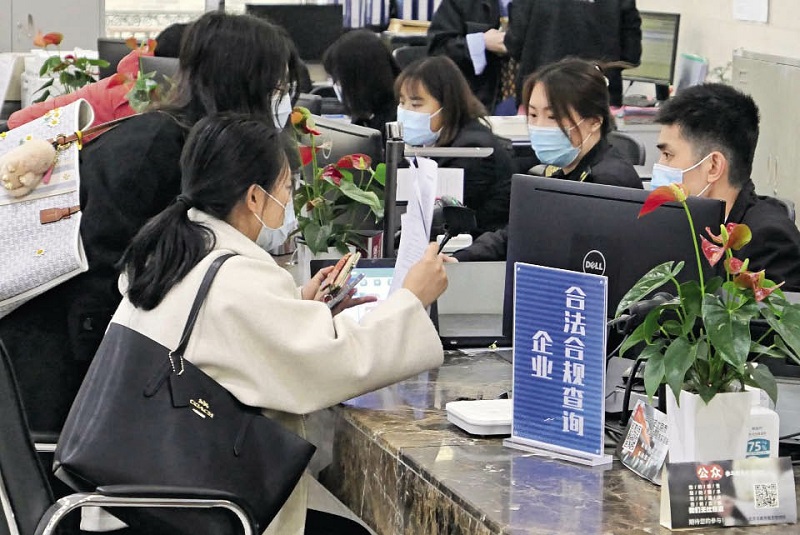Chinese enterprises must attach importance to cross-border compliance if they want to continue to grow into outstanding companies in the process of going global. That’s according to Liu Chao, secretary general of the International Commercial Dispute Prevention and Settlement Organization. The non-governmental and non-profit international organization, established in 2020, is one of the 283 achievements of the second Belt and Road Forum for International Cooperation. Proposed by the China Council for the Promotion of International Trade, the organization was jointly initiated by China Chamber of International Commerce and 45 business associations, legal service agencies, and university think tanks from more than 20 countries and regions in Asia, Europe, Africa, North America, and South America. It is committed to providing diversified, one-stop, full-chain legal services from dispute prevention to dispute resolution for international commercial entities and to building a new platform for unblocked trade and investment facilitation.
For Chinese-funded enterprises that carry out overseas investment and operations, cross-border compliance means that they must not only understand and abide by the laws and regulations of the host country (region), especially the national (regional) prohibitive regulations, but also pay attention to preventing moral hazards caused by cultural differences. These could include violations of local folk customs and religious beliefs in transnational investment and business activities. With the gradual acceleration of going global, the significance of cross-border compliance has become increasingly prominent.

Sanya in Hainan Province opens its largest cross-border e-commerce experience center on October 4, 2020.
Value of Compliance
Li Qijie is a senior compliance officer from the Legal and Compliance Department of China Machinery Industry Construction Group Inc. His company has a history of nearly 70 years and is one of the earliest large state-owned construction enterprises in China. The company has undertaken a large number of overseas construction projects, with important influence in more than 40 countries and regions around the world.
According to Li, although the company has a long history of cross-border operations, it was not until 2019 that a special compliance department was officially established with an operating full-time team. In just two years, the team has more than 100 full-time and part-time personnel. “With the increase in overseas operations, the company is paying an increasingly large amount of attention to compliance work,” said Li. He added that the company had previously participated in the World Bank and other multilateral bank projects, and currently the company has established a sound corporate integrity and compliance system in accordance with the World Bank’s standards.
Jia Shen, a consultant of Beijing Zhonglun Law Firm, once served as a judge for economic cases, and also handled anti-monopoly work in the Ministry of Commerce. Before joining the law firm, he worked as a director in a compliance center of a technology group. His experience gives him abundant practical experience in cross-border compliance. “A few years ago, the compliance challenges faced by Chinese companies such as Huawei and ZTE, when operating overseas, played a role in raising the awareness of compliance management of Chinese companies,” said Jia. According to him, some large domestic companies, including state-owned and private enterprises, have begun to deploy in the field of compliance. He suggested, “Compliance issues should be discussed as soon as possible and should be placed at the forefront of the company’s overseas operations as much as possible.”
More Than a Legal Issue
Liu Chao said there are more than 50,000 laws and regulations affecting enterprise’s foreign operations, which is a huge challenge to Chinese enterprises. But, he believes that cross-border compliance is not just a matter of law. “At present, the challenges of the international business environment faced by Chinese companies have changed from the initial problems of poor product quality, long quality-certification time, language barriers, and lack of understanding of trading habits, to a point where the importing country’s supervision on Chinese companies is strengthened due to the strong competitiveness of Chinese products,” said Liu. In order to ensure sustainable development, the commitments of countries and regions to emission peaks and carbon neutrality will also result in a series of rules. International standards and corresponding domestic policies of various countries severely impact the international business of enterprises, he said.
Wang Chunge, vice chairman of the China Association for Promoting International Economic & Technical Cooperation, said that compliance risks can be divided into three categories, namely risks related to social justice and moral rule, compliance commitment risks, and risks related to laws and regulations. As Chinese companies operate in different countries and regions when going global, the corresponding compliance risks are also different.
In this regard, Wei Chunshan from Beijing New Building Materials Group Co., Ltd. has rich experience. As the manager of the company’s international business department, Wei said that the company’s current foreign business is mainly oriented to Africa and Southeast Asia. Therefore, respecting local customs, cultures, and religious beliefs and fulfilling corporate social responsibilities constitute an important part of corporate compliance in the area of operation.
In addition, Yang Guohua, a professor at the School of Law, Tsinghua University, said that international economic and trade rules are developing rapidly. Outside the WTO regulations, regional economic and trade arrangements, such as the Regional Comprehensive Economic Partnership (RECP), have become effective supplements to WTO economic and trade regulations. At the national and enterprise levels, it is necessary to conduct research on these regional economic and trade arrangements.
“Through exchanges, I learned that only a small number of people in the compliance team at Siemens (China) headquarters are legal professionals. The rest of them are from the fields of compliance, business, and digitalization. This is similar to our company’s situation,” said Li Qijie, adding that he graduated with a bachelor’s degree in Vietnamese and has been engaged in international engineering project management and market development for many years. Not only is he proficient in English and Vietnamese, but also very familiar with the engineering business. In addition to legal knowledge, language skills and project experience are beneficial to help companies establish an integrity and compliance system based on the engineering business, which can help companies identify and prevent compliance risks throughout the business life cycle.

Beijing opens its first district-level “Compliance Information Inquiry” service counter in Chaoyang District on March 18, 2021.
Shouldering Heavy Responsibilities
According to Yang Guohua, compared with several years ago, many domestic companies have realized the importance of compliance issues. Most large companies have made relevant arrangements. Some companies have established a compliance department outside the legal department and established standardized compliance methods or processes. But he also believes that, compared with large enterprises, small and medium-sized enterprises are still weak in building a compliance system.
For Shaanxi Ainomei Pharmaceutical Co., Ltd., a medical and protective equipment manufacturer established in 2014, the COVID-19 pandemic has opened up the company’s protective equipment to the international market. “Medical protective gear, such as masks, have higher requirements for compliance, having to meet both the importer’s sanitary standards, domestic quality standards, and export requirements,” said the company’s president Lei Lijuan. Benefiting from the company’s strict implementation of standards and rigid quality control, there have been no complaints about masks and other materials exported to the EU by the company, said Lei. According to her, since its import and export business started, the company’s awareness of cross-border compliance operations has gradually increased and in the future, as the scale of operations continues to expand, the company will consider setting up compliance positions.
In Yang Guohua’s view, small and medium-sized enterprises have relatively weak capabilities and less funds, which requires them to rely more on the power of industry associations to provide compliance consulting or training services for member companies. “You cannot expect companies to set up compliance positions no matter how small they are. Compliance personnel can be shared, and training is also an effective way,” said Yang.
Zhang Hua, deputy director of the China International Youth Exchange Center, said that the center hopes to build a platform for young Chinese entrepreneurs to participate in international competition and cooperation, and enhance their core competitiveness through a series of theme activities such as cross-border compliance, international public procurement, and intergenerational transition. Efforts will be made to promote young entrepreneurs in being competitive in the international market.
In addition, Liu Chao said that in March 2021, the Ministry of Human Resources and Social Security, together with the State Administration of Market Regulation, and the National Bureau of Statistics, officially announced 18 new occupations to the public, one of which is corporate compliance specialist. He believes that advancing the training and certification of corporate compliance specialists will surely provide a more solid talent guarantee for Chinese companies to prevent risks in domestic and cross-border operations.